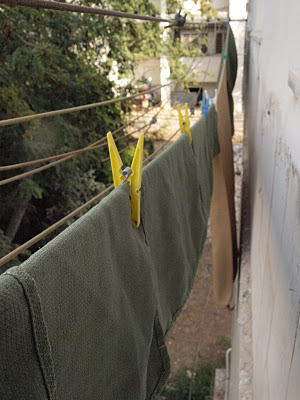Celebrating the Resurrection in Israel
As I learn more and more about Judaism, one of the areas that I'm consistently awed is how the Lord used the Hebrew calendar to mark the significant events of Yeshua's life. Or to say it differently - how Yeshua fulfilled the covenants found in the Holy Days on the Hebrew Calendar as the Jewish Messiah.
Take Passover, for example. This is the festival that celebrates the Exodus from Egypt. Anyone who is familiar with the story knows about the plagues that Moses released on to Egypt and the blood of the slain lamb that caused the angel of death to 'pass over' the homes of Jewish families so that the lives of their firsts born would be spared. It is easy to see the prophecy of Yeshua in this story. He is the slain lamb whose blood allows the judgment of God to pass over all who believe at the end of the age.
Beyond simply being able to see Yeshua's prophetic fulfillment of this story, very few people know that he actually fulfilled it during the celebration of Passover on the Hebrew calendar. This is primarily because in the 3rd century AD the council of Nicea "gentilized" Christianity, removing belief in Yeshua from the appropriate Hebrew roots. The celebration of the resurrection was moved from its place on the Hebrew calendar, to a pre-existing pagan Holiday, Easter.
The meal that we always refer to as "The Last Supper" is actually the Passover Seder. Yeshua and his disciples were participating in the traditions of the Seder as he introduced what the church refers to as communion. He was arrested sometime after the Seder, tried, crucified and then resurrected all within the week following passover, known as the Feast of the Unleavened Bread. (See Matt. 26)
Devin and I are committed to celebrating the resurrection within the week following Passover. Although this is a more biblically accurate time to celebrate, it is not out of legalism that we have made this decision, but rather because we believe it testifies before our non believing Jewish neighbors that Yeshua is the Jewish Messiah, and sustains Devin's heritage as a Jewish believer in Yeshua. Keeping His resurrection connected to this time on the Hebrew calendar, also preserves a great deal of the meaning of Yeshua's actions that have been lost by separating the resurrection from passover.
By celebrating the Resurrection with Passover, we will often acknowledge this profound event at a different time than many of our friends and family. Uniquely, this year Easter fell within the week of the Feast of the Unleavened Bread, so we went on a Resurrection Adventure in a very crowed Jerusalem, full of both Jewish and Christian tourists.
More on our adventure in my next post. ;)
Resources:
Your People Shall Be My People by Don Finto
Homecoming: Our Return to Biblical Roots by Chuck and Karen Cohen
Related Posts:
Pedestrians in the Desert for 40 Years?
Shabbat Letter Tisha B'Av
Take Passover, for example. This is the festival that celebrates the Exodus from Egypt. Anyone who is familiar with the story knows about the plagues that Moses released on to Egypt and the blood of the slain lamb that caused the angel of death to 'pass over' the homes of Jewish families so that the lives of their firsts born would be spared. It is easy to see the prophecy of Yeshua in this story. He is the slain lamb whose blood allows the judgment of God to pass over all who believe at the end of the age.
Beyond simply being able to see Yeshua's prophetic fulfillment of this story, very few people know that he actually fulfilled it during the celebration of Passover on the Hebrew calendar. This is primarily because in the 3rd century AD the council of Nicea "gentilized" Christianity, removing belief in Yeshua from the appropriate Hebrew roots. The celebration of the resurrection was moved from its place on the Hebrew calendar, to a pre-existing pagan Holiday, Easter.
The meal that we always refer to as "The Last Supper" is actually the Passover Seder. Yeshua and his disciples were participating in the traditions of the Seder as he introduced what the church refers to as communion. He was arrested sometime after the Seder, tried, crucified and then resurrected all within the week following passover, known as the Feast of the Unleavened Bread. (See Matt. 26)
Devin and I are committed to celebrating the resurrection within the week following Passover. Although this is a more biblically accurate time to celebrate, it is not out of legalism that we have made this decision, but rather because we believe it testifies before our non believing Jewish neighbors that Yeshua is the Jewish Messiah, and sustains Devin's heritage as a Jewish believer in Yeshua. Keeping His resurrection connected to this time on the Hebrew calendar, also preserves a great deal of the meaning of Yeshua's actions that have been lost by separating the resurrection from passover.
By celebrating the Resurrection with Passover, we will often acknowledge this profound event at a different time than many of our friends and family. Uniquely, this year Easter fell within the week of the Feast of the Unleavened Bread, so we went on a Resurrection Adventure in a very crowed Jerusalem, full of both Jewish and Christian tourists.
More on our adventure in my next post. ;)
Resources:
Your People Shall Be My People by Don Finto
Homecoming: Our Return to Biblical Roots by Chuck and Karen Cohen
Related Posts:
Pedestrians in the Desert for 40 Years?
Shabbat Letter Tisha B'Av


Comments
Post a Comment